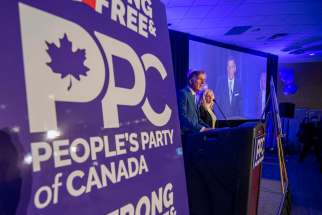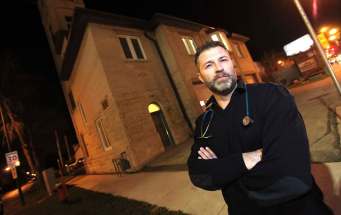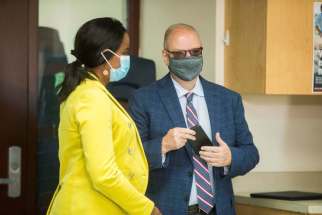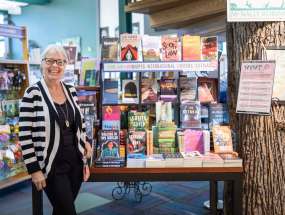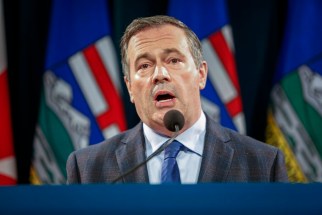Targeting the unvaccinated Province to spend $14M to reach Manitobans who aren't immunized against COVID-19
Read this article for free:
or
Already have an account? Log in here »
To continue reading, please subscribe:
Monthly Digital Subscription
$0 for the first 4 weeks*
- Enjoy unlimited reading on winnipegfreepress.com
- Read the E-Edition, our digital replica newspaper
- Access News Break, our award-winning app
- Play interactive puzzles
*No charge for 4 weeks then price increases to the regular rate of $19.00 plus GST every four weeks. Offer available to new and qualified returning subscribers only. Cancel any time.
Monthly Digital Subscription
$4.75/week*
- Enjoy unlimited reading on winnipegfreepress.com
- Read the E-Edition, our digital replica newspaper
- Access News Break, our award-winning app
- Play interactive puzzles
*Billed as $19 plus GST every four weeks. Cancel any time.
To continue reading, please subscribe:
Add Free Press access to your Brandon Sun subscription for only an additional
$1 for the first 4 weeks*
*Your next subscription payment will increase by $1.00 and you will be charged $16.99 plus GST for four weeks. After four weeks, your payment will increase to $23.99 plus GST every four weeks.
Read unlimited articles for free today:
or
Already have an account? Log in here »
Hey there, time traveller!
This article was published 21/09/2021 (1539 days ago), so information in it may no longer be current.
This summer, a team of community health workers set out to increase the COVID-19 vaccination rate at a St. James-area Manitoba Housing complex.
The effort was part of a pilot project led by the University of British Columbia and funded by the Public Health Agency of Canada to raise immunization rates in communities in western Canada experiencing barriers to health care.
The housing complex was identified as having low vaccine uptake after a review of patient records by local family physicians. The team devised a plan to get residents vaccinated, offering a clinic at the low-income housing building.
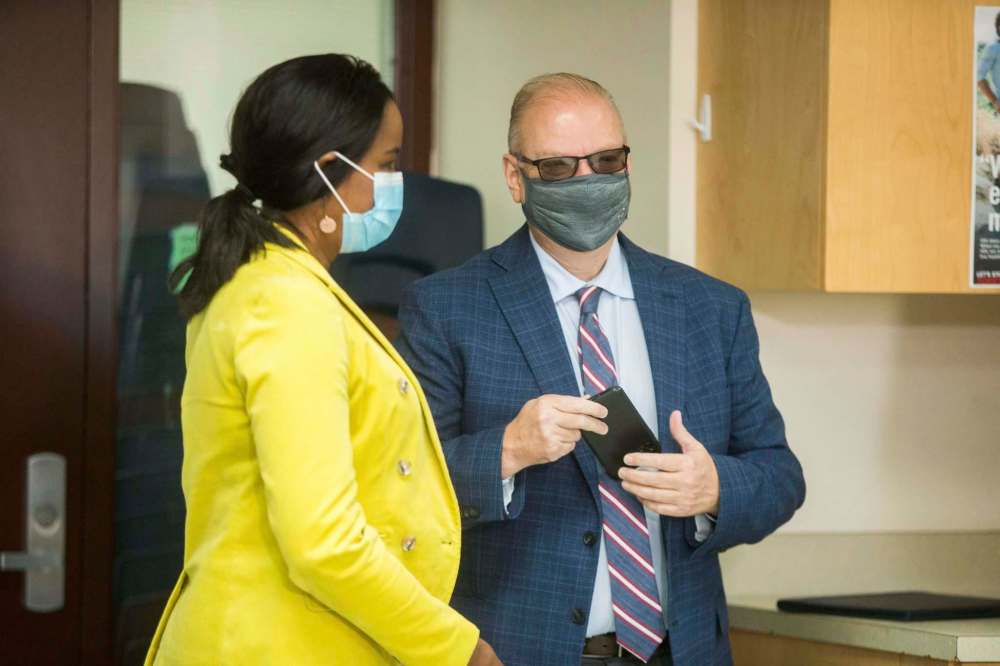
At the end of the vaccine push, the immunization rate in the complex doubled, organizers estimated.
On Tuesday, the Manitoba government announced it would spend nearly $14 million to expand the pilot program across the province and support physicians and pharmacists providing vaccine outreach.
“We are headed towards a fourth wave, I don’t think anyone is denying that, so what we want to do is increase the numbers of vaccinations as quickly as possible,” Health Minister Audrey Gordon said during the announcement at Nine Circles Community Health Centre in West Broadway.
Gordon, who was joined by representatives from Doctors Manitoba, Pharmacists Manitoba and the Manitoba College of Family Physicians, said a majority of Manitobans has been vaccinated against COVID-19.
However, she said efforts must continue to reach the 20 per cent who are not fully immunized.
“Now we have a grouping of individuals that are vaccine hesitant, so we have to take a targeted approach to addressing that issue and going to the local community and regional levels to do that,” Gordon said.
“Physicians and pharmacists will be able to develop their own strategies to connect with patients in their homes and communities, building on their local knowledge.”
A significant part of the outreach program involves developing a “neighbourhood medical model” which can include social support workers, doctors and pharmacists to respond to barriers and concerns that may be delaying immunization, said Dr. Karen Appel, a director with the Manitoba College of Family Physicians.
“As a result, by working together, by bringing teams together, we have a higher chance of actually being able to convey the messaging that we want to the individuals who have thus far been somewhat hesitant about getting the vaccine,” Appel said.
Across Manitoba, at least nine facilitator positions will be funded to lead workshops and spearhead outreach efforts based on local vaccination data. The workshops will be in collaboration with family physicians and community support workers.
Low immunization rates exist in communities across the province, including in Winkler, which has a vaccination rate of only 40.8 per cent. Neighbouring Stanley has Manitoba’s lowest rate at 23.9 per cent.
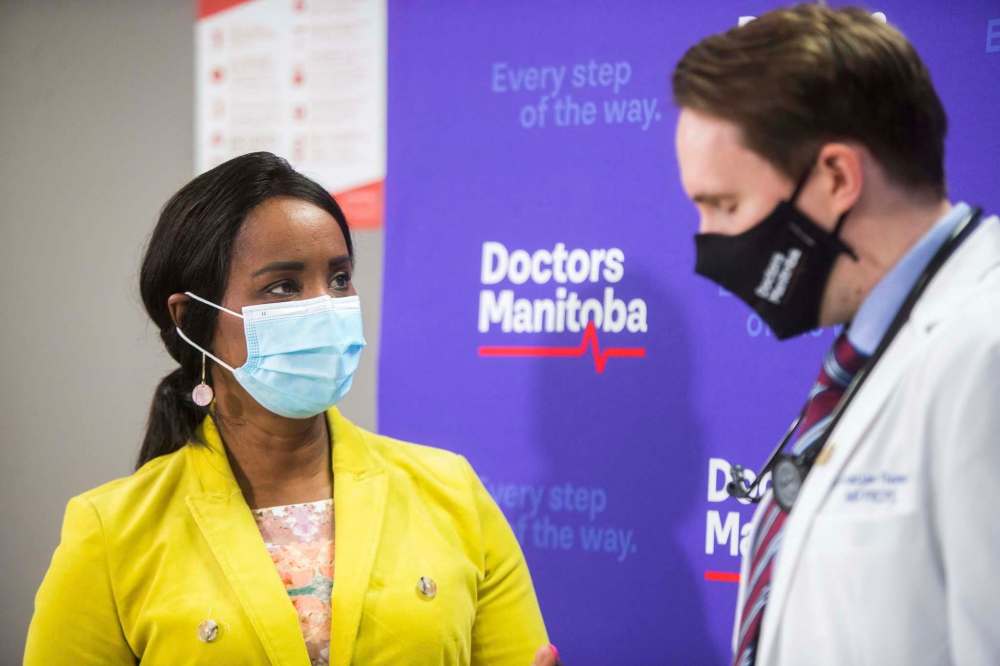
In Winnipeg, Point Douglas has the lowest COVID-19 vaccination rate at 77.3 per cent.
Premier Kelvin Goertzen said outreach programs can produce results, even in the most vaccine-hesitant communities where government appeals do not resonate.
“The ability for doctors and pharmacists to proactively engage with Manitobans will make a difference,” Goertzen said. “I do think it’s going to move the dial, I think it will get more people vaccinated and ultimately that is our goal, to keep our hospitals from being overwhelmed, our businesses open, our schools open.”
Manitoba NDP Leader Wab Kinew called on the Tory government to double its efforts in Manitoba’s southern health region, which includes Winkler and Stanley and has a vaccination rate of 65.2 per cent.
Kinew questioned why outreach programs are being announced nine months into the immunization campaign.
“Certainly the government has been getting advice for a long time that they should take action here and I can’t help but wonder if there aren’t political considerations that are getting in the way here,” Kinew said.
“Now’s the time for leadership. Now’s the time for these MLAs who represent some of these regions with low vaccine uptake to go and talk to people that you represent about why this is so important.”
danielle.dasilva@freepress.mb.ca

Our newsroom depends on a growing audience of readers to power our journalism. If you are not a paid reader, please consider becoming a subscriber.
Our newsroom depends on its audience of readers to power our journalism. Thank you for your support.

